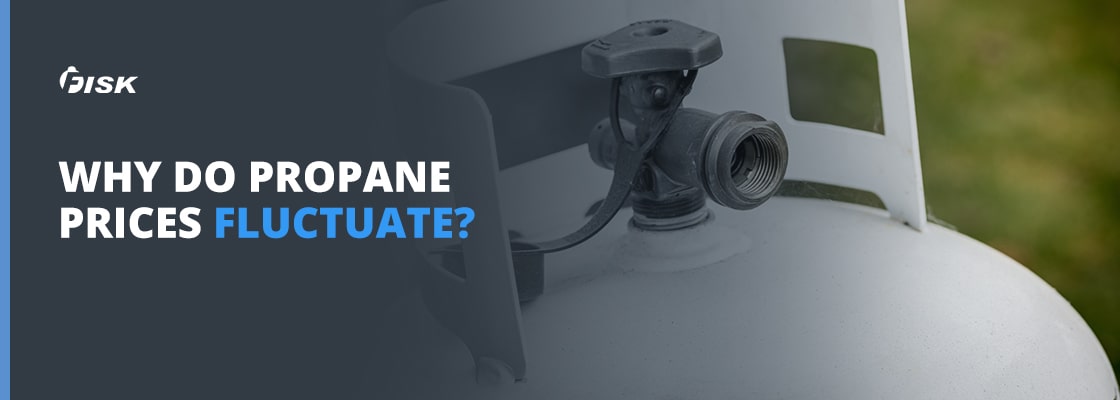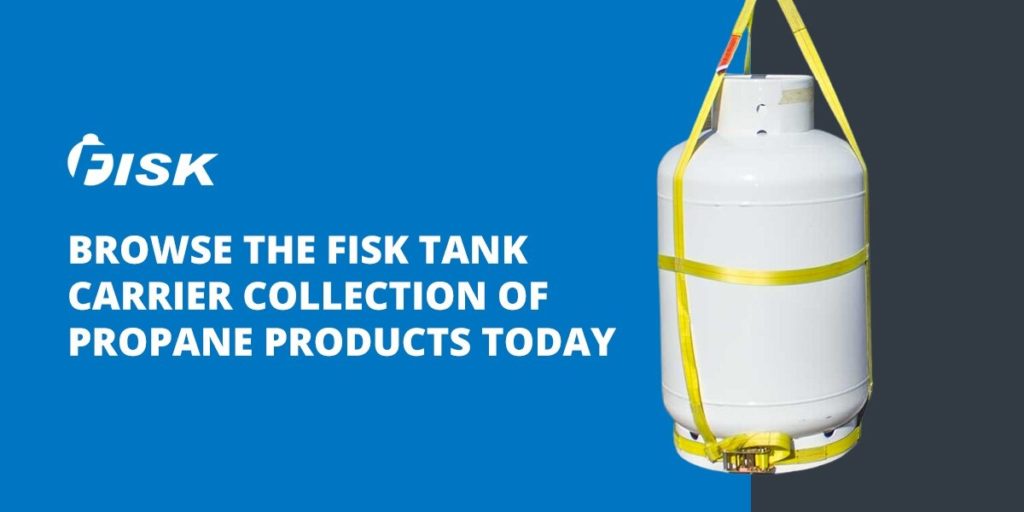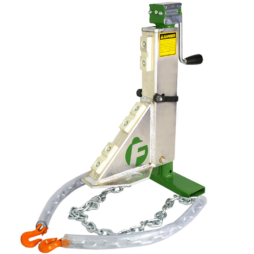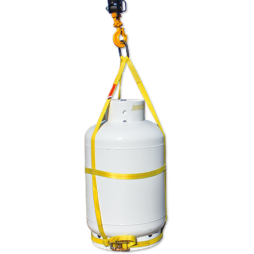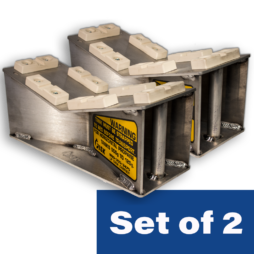Table of Contents
1. Do Propane Prices Fluctuate?
2. Reasons Why Propane Prices Fluctuate
3. Why Do Propane Prices Spike?
4. Best Time To Buy Propane for Home Heating
5. FAQs About Propane Pricing
Throughout the country, around 5% of United States households use propane to heat their homes — that is about 64 million houses, not counting the number of business owners who do the same. Unlike forms of energy like electricity, propane is a commodity that consumers must purchase every time they run out. Therefore, it is crucial for homeowners and business owners to be aware of how and why propane prices can increase and decrease.
Does the price of propane rise or fall? Is propane cheaper in the summer? Why do propane prices spike? Learn the answers to all of your propane price questions here.
Do Propane Prices Fluctuate?
The answer is yes. Like other energy sources, such as oil or natural gas, propane is a commodity subject to numerous price-changing factors. These costs fluctuate throughout the year as a result of said variables. While propane expenses typically do not shift by more than a few cents, even the smallest changes can make an impact on your energy bill.
Therefore, homeowners and business owners who use propane should be informed about how to get the lowest propane prices. This knowledge starts with understanding what circumstances impact propane prices. Then, you can determine the most economical time to purchase your propane.
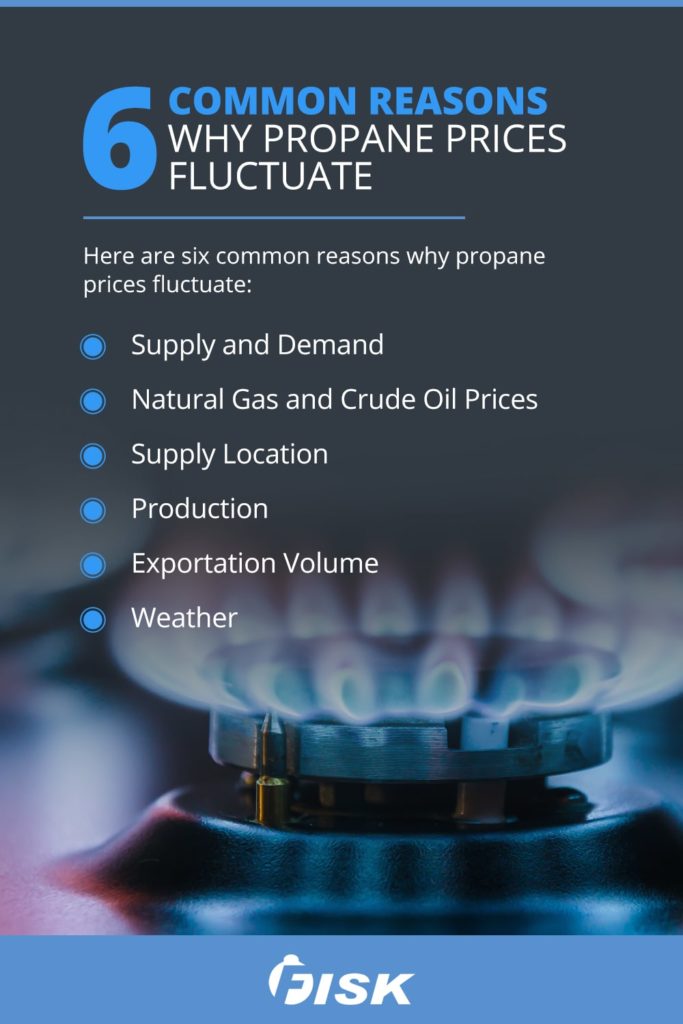
6 Common Reasons Why Propane Prices Fluctuate
The reasons why propane prices fluctuate are extensive, and they are all beyond consumers’ control. However, understanding propane gas prices will help you become a more informed buyer. Even though you do not have power over how much your propane will cost, you can make smarter choices about when you decide to purchase it. If you know what affects propane prices, you can better determine when increases are on the horizon.
Here are six common reasons why propane prices fluctuate:
1. Supply and Demand
Similar to millions of other products, supply and demand affect propane costs.
This resource is not necessarily seasonal — propane companies extract and sell propane year-round. However, the times when consumers use propane are seasonal. Because people use propane to supply heat, many consumers only use their propane in the fall and winter when outdoor temperatures begin to decline, so demand rises from October to March. Further, snowstorms and cold snaps that bring sudden frigid temperatures often increase demand.
Additionally, the propane supply can experience shortages. In late 2021, some researchers predicted a propane shortage in the U.S. due to stress on the already exhausted inventory. However, as of January 20, 2022, the Energy Information Administration (EIA) notes that despite recent maintenance and outage issues involving crude oil production, which creates propane, it still expects petroleum-producing countries to meet global demand.
While consumers cannot control supply and demand, it is important to keep an eye on unique supply and demand situations so you understand the current state of the market.
2. Natural Gas and Crude Oil Prices
Because propane is a byproduct of natural gas and crude oil refining, natural gas and crude oil prices impact propane costs. For example, when an incident happens that impacts crude oil production, such as the recent demonstrations in Kazakhstan, propane prices may rise. The majority of U.S. propane — 76% as of 2020 — is derived from natural gas, so circumstances that affect natural gas production are more likely to impact its propane costs.
3. Supply Location
Typically, transportation distance will impact the cost of propane. While the U.S. mostly sources its own natural gas, and thus its own propane, it imports a small amount of both from Canada and Mexico. After importing and processing, propane goes to storage facilities throughout the country. Then, it arrives at local suppliers to become available for purchase. This process takes time, energy and money, which is reflected in the product’s cost.
4. Production
Due to propane’s byproduct nature, it is impossible to produce more when natural gas and crude oil production is low. Unfortunately, even when consumers demand more propane, it does not mean propane production can increase. This factor solely depends on whether enough natural gas or crude oil exists, both of which can face shortages from a multitude of circumstances.
If natural gas or crude oil production faces concerns, distributors may be able to remedy the situation with reserves or imports. That approach does not always work, and even when it does, the supply chain can still face issues when low supplies are coupled with increased demand. After all, it is one thing to deal with short supplies when demand is normal, but high demand makes production issues even more urgent.
Much of propane-related supply chain issues have to do with bottlenecks. If more consumers are suddenly demanding propane, the supply chain can have a difficult time keeping up. This concern is evident in how quickly demand for propane grew throughout 2020 and 2021 as a symptom of the COVID-19 pandemic. More people requiring heat at home and lighting their backyard grills caused prices to rise.
5. Exportation Volume
Just as the U.S. imports some of its propane from other countries, it also exports propane worldwide — as of 2020, the U.S. sends the most propane exports to Japan. If propane exportation is higher than production or importation, it can impact how much propane is available to consumers. Then, propane prices fluctuate, becoming more expensive for said consumers.
6. Weather
Knowing common weather patterns can help you determine propane costs. Because propane users need propane for heat, they must ensure they are stocked up for the fall and winter — as stated, October through March is typically when propane use surges. If you can estimate when the coldest temperatures will arrive, you can avoid paying more for propane. Keep in mind that cold temperatures in one area will impact propane prices throughout the country, as well.
However, you should note that certain weather incidents are difficult to predict. A sudden snowstorm in September may cause consumer propane demand to rise when you expected it least. Additionally, propane production can experience delays when natural disasters occur, impacting when storage hubs receive shipments.
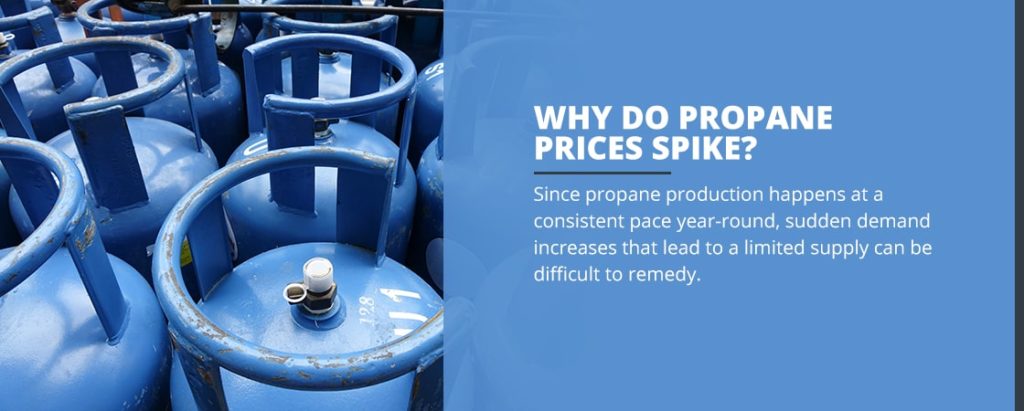
Why Do Propane Prices Spike?
Though propane costs can fluctuate throughout the year as a result of numerous factors, they can also spike. The term “spike” refers to sudden increases in propane prices. These surges can happen from month to month or in comparison to the previous season or year.
Since propane production happens at a consistent pace year-round, sudden demand increases that lead to a limited supply can be difficult to remedy. There is not always a standby propane supply available, and imports do not necessarily help meet demand, as transportation costs can be expensive. Therefore, when supplies begin to run out, prices will spike as they would with any commodity in high demand and short supply.
The most common reason for sudden increases is one-time weather events. An unforeseen spell of cold weather is one example. Other issues that affect propane prices, like global political situations or supply chain disruptions, will usually impact the propane supply over a period of time — not immediately. These concerns may cause propane costs to rise, but they will not necessarily make them spike.
When it comes to propane, price spikes may not appear noteworthy. Generally, consumers will not face prices that have increased by more than around 20-30 cents — the biggest propane cost spike in 2021 was just under 30 cents. If you can leave room in your budget for potential spikes, you should be able to navigate any potential spikes that happen throughout the year.
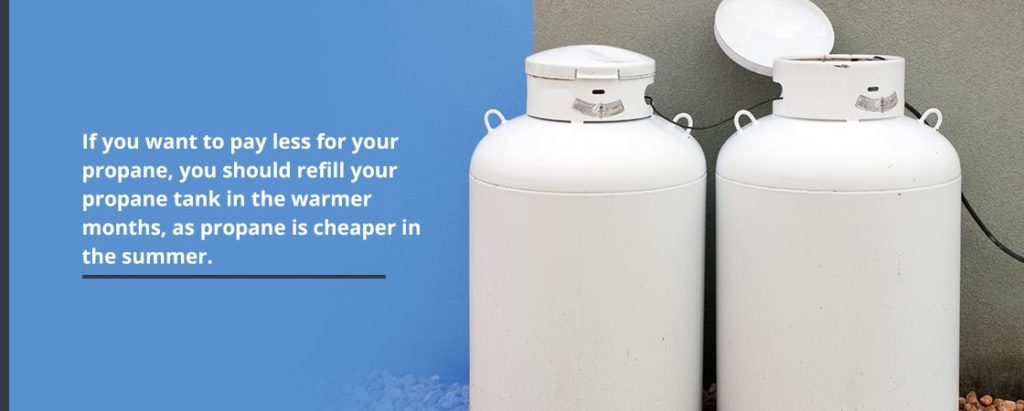
When Is the Best Time to Buy Propane for Home Heating?
The best time to buy propane will depend on your situation. Are you looking for propane to heat your home? Do you need multiple propane tanks for your business? How much propane do you need? These are all questions you should consider as you prepare to purchase propane throughout the year.
If you want to pay less for your propane, you should refill your propane tank in the warmer months, as propane is cheaper in the summer. If you prefer to wait until fall, you should buy your propane by late September at the latest to lock in lower propane prices. In some areas, early fall is a better time to buy propane anyway, as many people need propane for grilling in the summer.
So long as you plan your propane delivery before regular cold weather arrives, you will likely lock in propane prices for less.
Propane Price Fluctuations FAQ
Do you have specific questions about propane costs? Fisk has the answers. Read below for answers to common propane-related questions:
What Is the Price of Propane?
Will propane prices go up? Will propane prices go down? These questions are often on consumers’ minds, especially during the fall when it is time to restock propane tanks. According to the EIA, as of January 24, 2022, the average price of residential propane in the U.S. is $2.74 per gallon. Those who purchase wholesale propane can expect to pay more than a dollar less. Remember that propane costs vary state-to-state, so you may pay more or less than the average.
How Do You Avoid Paying the Highest Price for Propane?
One way to obtain inexpensive propane is to buy propane when demand is low. Depending on your location, late spring, summer and early fall are often the best times to find propane at lower prices. If you live in an area with mild winters, you may be able to wait until later in the fall to purchase propane, as demand may not increase until December or January.
A second way to avoid paying steep prices for propane is to participate in a buying program with your propane provider. Across the country, numerous propane companies offer programs that allow consumers to buy large amounts of propane in advance at a single price. This way, consumers can buy their propane supply in advance at a locked-in cost, avoiding having to pay for propane when it is surging.
Last, you should pay attention to how much propane your home or business uses on average. This amount can be difficult to monitor, especially when you have experienced unexpected cold weather. However, by keeping an eye on your propane use, you can predict how often you will need to refuel your tank. Then, you can schedule tank refills at times when propane is often the most inexpensive.
Do Propane Prices Fluctuate With Gas Prices?
The answer is no. Any prices you see at the gas station will not reflect the current state of propane prices. While it is true that propane can be a byproduct of crude oil, which is the base of gas, it more commonly comes from natural gas. Furthermore, propane is different from gas, meaning it is subject to its own reasons for fluctuations, such as demand — more people driving does not mean more people are using propane.
When Is Propane The Cheapest?
Considering when propane prices go up and down will help you determine the best month to refill your propane tank. Generally, the best month to buy propane will be in the summer or early fall. These months tend to be when demand for propane is decreasing. If you would like to monitor costs over a particular period, you can do so for your state via the EIA’s website.
How Much Does the Price of Propane Fluctuate?
The price of propane does not often fluctuate by much in a short period. There are some months when propane costs will rise or fall by only a few cents. However, propane prices can shift by tens of cents in some cases, which can impact homeowners’ and business owners’ budgets. A look at early 2021 shows that propane costs per gallon jumped from $2.11 to $2.30 from January to February.
There is no set amount to which propane costs will increase or decrease. Remember that various circumstances can impact propane prices at any given moment, so what you pay one month may stay the same or noticeably fluctuate during the next month. Consider following propane news, pre-buying propane stocks and filling up your propane tank in the off-season to can avoid significant changes that negatively affect your budget.
View Our Propane Service Trucks and Trailers Today
Fisk Tank Carrier is an expert in propane tank installation and service trucks. If you are a business that services propane in your area, we can provide you with the equipment your team needs to run a successful operation. The team of engineers at Fisk work hard to ensure all of our trucks and trailers come with the best parts, so you can save money on gas and maintenance due to limited wear and tear.
Partnering with us to fulfill your propane service needs means you receive individual attention. If you have any comments, questions or concerns along the way, you can rest assured that we will work with you to find an immediate answer or solution. Put your trust in Fisk for quality service.
Feel free to browse our online store, truck options and trailer selection. Please reach out to us to get in touch with a Fisk specialist today.
Further Reading
Is the Propane Industry Growing?
How Big Is the Propane Industry?
Advice to Someone Starting a Career in the Propane Industry
Which Industries Use the Most Propane?
